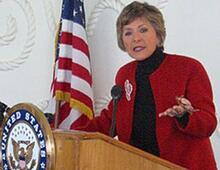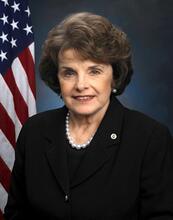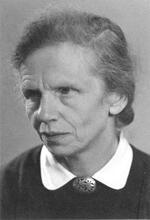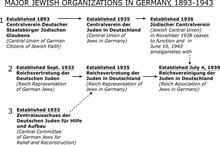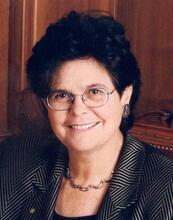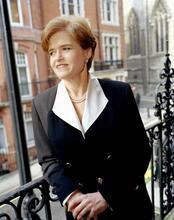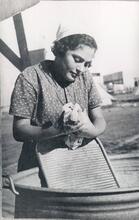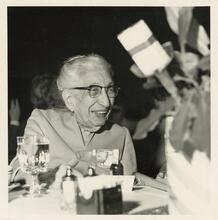Frieda Wunderlich
German economist and politician Frieda Wunderlich’s career in the 1920s and 1930s included editing a political journal, publishing numerous books and articles on social policy and economic theory, and lecturing at a variety of educational institutions. Elected in 1925, she served as a member of the Berlin City Council for eight years and in the Prussian Diet from 1930 to 1932. In 1933, having been dismissed from her academic position as both a Jew and a woman, Wunderlich decided to go into exile. After her departure, she became the only woman faculty member of the New School for Social Research in New York. She achieved international recognition for her research and publications on labor and social policy, including women’s work.
Article
Frieda Wunderlich, a prominent economist and politician in Germany, became the only woman faculty member of the New School for Social Research in New York when it was established in 1933 as a haven for academic refugees from Nazism. She achieved international recognition for her research and publications on labor and social policy, including women’s work.
Born into a middle-class Jewish family in Berlin in 1884, she was the older of two sisters. Her father, David Wunderlich, owned a wholesale textile business. After completing a girls’ high school in 1901, Frieda worked in her father’s firm for several years. In 1910, she passed her matriculation examination and began studying economics at the University of Berlin and then in Freiburg. In 1919, she received her doctorate in political science summa cum laude from the University of Freiburg with a dissertation on Taylorism.
During World War I, Frieda Wunderlich interrupted her studies to head a division of the National Women’s Service dealing with public and private welfare work. Thereafter, she worked for the Brandenburg War Department for Labor and Welfare as a specialist in industrial protection of women and employment counselling and then for the Central Board for Foreign Relief, responsible for the distribution of food and textiles from abroad. She later served as judge in the German Supreme Court for Social Insurance. From 1923 to 1933, she edited the political journal Soziale Praxis and published numerous books and articles on social policy and economic theory. She lectured at a variety of educational institutions, including the Women’s School for Social Welfare and the Graduate School for Civil Administrators, and in 1930 became a professor at the Vocational Pedagogical Institute in Berlin.
Elected on the German Democratic Party ticket, she served as a member of the Berlin City Council for eight years and in the Prussian Diet from 1930 to 1932. She was also involved in the Commission for Women’s Work of the International Labor Office. In 1933, having been dismissed from her academic position as both a Jew and a woman, Wunderlich decided to go into exile, resigning from the City Council upon her departure.
Wunderlich was extremely fortunate to receive a job offer from the New School for Social Research, which she accepted with a heavy heart; she was the only woman among the foreign scholars hired. In 1939, she was elected dean of the graduate faculty of political and social science and served as professor of economics, labor, and sociology until her retirement in 1954. She was highly regarded as an effective and warmhearted teacher, as well as a gifted researcher. While in the United States, she continued to publish widely on labor and social policy in Germany and Britain. In 1954, the University of Cologne awarded her an honorary doctorate in political science in recognition of her distinguished contribution to the social sciences.
In her later years, Frieda Wunderlich lived with her younger sister, Dr. Eva Wunderlich, who was a professor of German at Upsala College in New Jersey. She died in their home in East Orange in December 1965, at age eighty-one. The New School established the Frieda Wunderlich Prize for outstanding foreign graduate students in her memory.
Selected Works
British Labor and the War. New York: The Graduate Faculty of Political and Social Science, New School for Social Research, 1941.
Der Kampf um die Sozialversicherung. Berlin: Deutscher Verband der Sozialbeamtinnen, 1930.
Die Bekaempfung der Arbeitslosigkeit in Deutschland seit Beendigung des Krieges. The University of Michigan, 1925.
Farmer and Farm Labor in the Soviet Zone of German. New York: Twayne Publishers, 1958.
Farm Labor in Germany, 1810–1945. Princeton University Press, 1961.
German Labor Courts. Chapel Hill: University of North Carolina Press, 1946.
Hugo Muensterbergs Bedeutung fuer die Nationaloekonomie. The University of Wisconsin-Madison, 1920.
Labor under German Democracy: Arbitration 1918–1933. New York: The Graduate Faculty of Political and Social Science, New School for Social Research, 1940.
“Versicherung, Fuersorge und Krisenrisiko.” Aufbau und Ausbau der Fürsorge : Veröffentlichungen des Deutschen Vereins für Öffentliche und Private Fürsorge 18 (1932).
Backhaus-Lautenschläger, Christine. Und standen ihre Frau: Das Schicksal deutschsprachiger Emigrantinnen in den USA nach 1933. Pfaffenweiler: Forum Frauengeschichte, 1991.
Baldwin, William H. “Woman is Named Dean of Exiles’ University; Colleagues Unanimously Pick Dr. Frieda Wunderlich.” New York Times, Feb. 21, 1939.
Hirsch, Luise. From the Shtetl to the Lecture Hall: Jewish Women and Cultural Exchange. Lanham, MD: University Press of America, 2013.
International Biographical Dictionary of Central European Emigres. Vol. 1: 837. Munich: K. G. Saur Verlag, 1980.
Kaznelson, Siegmund, ed. Juden im Deutschen Kulturbereich. Berlin: Jüdische Verlag, 1959.
Krohn, Claus-Dieter. Intellectuals in Exile: Refugee Scholars and the New School for Social Research. Translated by Rita Kimber and Robert Kimber. University of Massachusetts Press, 1992.
Lowenthal, Ernst G. Juden in Preussen: Biographisches Verzeichnis. D. Remier, 1981.
“Obituary.” New York Times. December 31, 1965: 21.
Preller, Ludwig. “In Memoriam Frieda Wunderlich.” Sozialer Fortschritt, 15, no. 2 (1966): 45–46.
Wunderlich, Frieda. Frieda Wunderlich Collection, AR-C1288-3230, Leo Baeck Institute, NYC.

